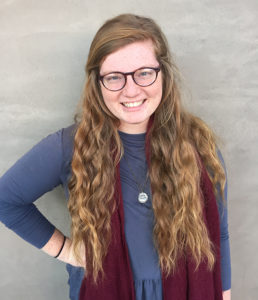Meet the Intern: Marlena Trafas

Please welcome our new editorial intern, Marlena Trafas!
TheHumanist.com: What is your educational and work background?
I just graduated from the University of California, Berkeley, with a degree in political economy, which is the study of classical and contemporary theories of state and market and how these ideological systems have manifested practically in the real world, past and present. I spent a wonderful semester abroad in Dublin, Ireland, taking courses in economics, politics, and sociology at Trinity College Dublin. I’ve worked for an online culture magazine associated with my university, for the San Francisco-based publication Lone Wolf, and as my sorority’s health worker. All these experiences helped cultivate my writing skills outside of the classroom and gave me fabulous opportunities to express and share ideas with a greater audience.
TheHumanist.com: How did you first learn about humanism?
Honestly, I first heard about humanism when I found the listing to be the editorial intern for the magazine. However, when I clicked on the organization’s website and saw the “good without a god” tagline I was pretty sold, as that had been a guiding thought of mine all throughout childhood. Coming from a great, but completely atheistic household, I never understood why the goodness in people had to be equated with a religion.
TheHumanist.com: Did you grow up in a traditional religious faith? How did it impact you?
As stated above, I never grew up in a traditional religious faith. My parents and even my grandparents were very relaxed when it came to all that. In my lifetime, I don’t think I ever saw any of them ever regularly attend church.
I did have a couple of religious experiences growing up that did have minor impacts. My older half-brother (same Dad, different mothers) was Catholic, and I was eager to spend time with him, so I would go to Sunday Mass some years for Easter (never did I give up my Christmas morning gift opening!). There are two distinct memories I have from going. One, trying desperately not to fall asleep during the service, and two, wondering why I didn’t get any of the confirmation snacks!!
When I was eleven I dabbled briefly in a Christian youth group that met every Wednesday. I did it solely to see my old friends from elementary school now that we had started at different middle schools. I remember there was dinner, games, and one time, for some reason that completely eludes me now, we went to the mall. Despite those fun things, I could just never really get into God. In my mind, I didn’t know who this “God” guy was. I had prayed to him just like all these people had told me to do and he just never came through. It didn’t make sense. When I asked my mom or dad for something they either gave it to me or explained why I couldn’t have it. God never explained! I also remember distinctly believing my friends were stupid if they needed some book to tell them how to be nice. While I understand there’s more to it than that, I think I’ve done just fine as a godless individual.
TheHumanist.com: What interested you most about interning for the American Humanist Association?
It was definitely the opportunity to work on the magazine that enticed me to the organization. As corny and kiss-up as this may sound, I wholeheartedly believe in the Humanist’s mission to be “a magazine of critical inquiry and social concern.” People need outlets to express themselves, to think, and to be exposed to other thoughts and perspectives. The Humanist not only allows for that, but cultivates it, and I wanted to be a part of that.
TheHumanist.com: What book has influenced you the most?
All That is Solid Melts into Air by Marshall Berman was written in the 1970s and published in the early ’80s but is still so incredibly relevant to our experiences as modern people in this world. Berman discusses “modernity” and what it means to be “modern” personally and politically. His description of society as contradictory and fleeting helped me come to terms and understand how I interact as a person in a larger world and how my needs and desires are influenced by these constantly modernizing forces. He comes to these conclusions through discussions of historically iconic writings from Geothe to Marx. As a political economy student, I’m always fascinated by a good reading of Marx.
TheHumanist.com: If you could have dinner with any three people in the world (living or dead), who would they be and why?
Oscar Wilde (sarcastic and hilarious), Frida Kahlo (funky and artsy), and Melania Trump (just so much intrigue). What a wild time we would have.
